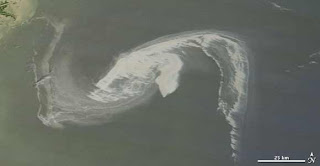Environmental Protection Agency Administrator Lisa P. Jackson flew over the gulf oil spill Saturday, later telling people at a meeting in New Orleans that “it’s like all five of the Great Lakes and the Great Lakes are oil sheen.”
Jackson spent much of her time dealing with residents' memories about Hurricane Katrina and the slow federal response to that disaster.
The meeting took place in a tiny church in the Lower Ninth Ward, a hardscrabble neighborhood symbolic of Washington’s ineptitude in responding to the 2005 hurricane. Almost five years after the storm ripped through, houses were abandoned, boarded up and spray-painted with markings that officials had left while searching for the dead: “9-10” for date inspected, “DEA” for agency, “0” for animals found, “0” for people.
Inside the church, stacks of The National Baptist Hymnal had been pushed aside for at least 50 people and some TV cameras. Community leaders questioned Jackson – who reminded them she had grown up in New Orleans – and their concerns were clearly informed by the sluggish Katrina response.
This time, however, BP was cast as the villain and Washington as a would-be white knight they didn’t yet trust. “I’m still leery of the EPA,” one man told Jackson, to scattered applause.
The crowd wanted to know if the government would work with community groups and call in social service help for still-fragile communities.“There aren’t any cities that have five years of practice in how to come together,” another man said. One woman mentioned the “double whammy” of Katrina and the oil spill on the poor.
“We are not well. No, we are not well,” said another speaker, Alice Craft-Kerney, a nurse who runs the Lower 9th Ward Health Clinic.
Questioners talked about needing “factual information,” as opposed to the rumor and commotion that marked the days after Katrina. One man fretted about Lake Pontchartrain near New Orleans, which thus far has been unaffected by the spill. Aaron Viles, campaign director for the Gulf Restoration Network, mentioned the conflicting reports of how much oil was spewing into the water.
“I’m worried a lot of spinning is happening,” Viles said. “We want to make sure the federal government is doing the math, not letting BP off the hook.”
The crowd worried about the potential for region-wide economic devastation and wanted BP to hire more local fishermen for the cleanup effort, saying the oil company hadn’t moved fast enough to enlist them near Venice, La., where the spill is poised to strike.
“I know everyone’s mad,” said a patient Jackson, who said Washington was overseeing the cleanup efforts and had pushed BP to hire locals. At least three times, she said some version of “the polluter pays,” which was met with applause and murmurs of “BP Oil.”
The slick had red-orange stripes that she compared to a tiger’s. Some of the oil booms intended to corral the spill had broken, though she said that was not uncommon. “I’m still praying they will be able to cut off the source,” she said.
Jackson said she was skeptical of dispersing the gushing oil at the wellhead, a method officials were testing, and that much about the spill’s potential effect was still unclear, including which fisheries might be closed and for how long.
“It’s just like a hurricane,” she said. “We’re looking at the forecast. We’re trying to figure out where it’s going to go.”
-- Geoff Mohan
Photo: NASA image of oil spill, April 29.
Subscribe to:
Post Comments (Atom)
Labels
htc
ilocos
time square bombing suspect
8MP Motorola MOTOROI is Coming to UK
8mp motorola motoroi
BPO
Celebrating IND or the International Nurses Day
Ilocos Pinapaitan
International nurses day
Justin Bieber Retrieves His Missing Hat Back
Machida vs. Shogun UFC 113
NY times square
Pinapaitang Baka
Samsung T359
Samsung T479 and Samsung T669
TechNickNews: Oil Spill
The Iron Man 2 Superhero is Here
Times Square bombing suspect car
amd e-350 netbook
android
apple
asus
asus 1215b
asus netbook
asus notebook
asus u31jg
basi
bella
bella's ring
beyonce knowles
bpo companies in the philippines
companie
company
discovered bomb
eclipse
edward
gadgetreview.info
hat
headline
htc evo
htc evo 3d
ilocos wine
ind
infringement
intel
ipad
iron man 2
ironman
ironman2
jacob
jay-z
justin bieber
macbook
mayweather vs mosley live stream
mayweather vs mosley live stream 24/7
microsoft
motorola
motorola motoroi
ms office 2010
nexus
nexus one
nexus one review
nexus one spec
nip silip
office mobile
oil spill
oil spill 2010
oilspill
paparazzi
pc authority
pinapaitan
samsung galaxy s review
samsung galaxy s video sample
samsung galaxy spec
samsung galaxy video samples
samsung t359 leak
samsung t479 leak
samsung t669 leak
suspect in time square bomb
suspicious package
time square bomb update
times square evacuated
twilight saga
u31jg
ufc 113
ufc113
wardrobe
wine
winmo 6.5
workforce

No comments:
Post a Comment